Are Your Competitors Running Ads You Can’t See? The “PPC vs SEO” Reconnaissance Mission
Uncover hidden advertising strategies and master the ultimate debate between Pay-Per-Click and Search Engine Optimization to dominate your digital landscape.
Published on May 15, 2025 • Updated on June 2, 2025
Table of Contents
Introduction: The Hidden Battlefield
In today’s digital landscape, the battle for visibility is fiercer than ever. Businesses are vying for the top spots on search engine results pages (SERPs), employing various strategies to capture the attention of potential customers. At the heart of this conflict lies the ongoing debate between Pay-Per-Click (PPC) advertising and Search Engine Optimization (SEO). This PPC vs SEO discussion has become central to digital marketing strategies worldwide.
But what if the battlefield is more complex than you imagine? What if your competitors are deploying tactics you can’t even see? The reality is that in the PPC vs SEO arena, there are hidden maneuvers and invisible campaigns that could be impacting your business without your knowledge. This comprehensive guide will serve as your reconnaissance mission, helping you uncover these hidden strategies and make informed decisions in the PPC vs SEO dilemma.
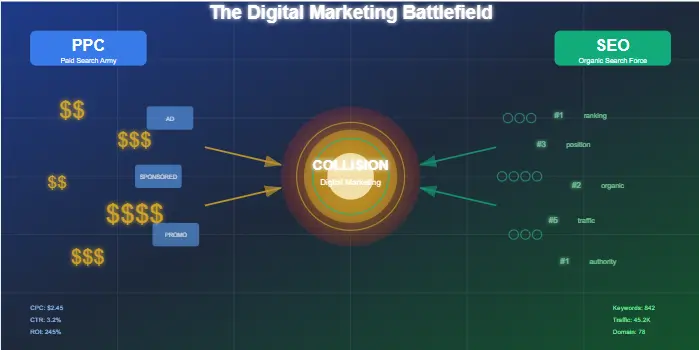
The digital marketing battlefield where PPC and SEO strategies collide
As we delve deeper into this PPC vs SEO exploration, we’ll equip you with the knowledge to identify what your competitors are doing, both visible and invisible. We’ll examine the strengths and weaknesses of each approach, reveal tools for competitive intelligence, and ultimately help you develop a strategy that maximizes your digital presence.
Understanding PPC: The Visible Combatant
Pay-Per-Click (PPC) advertising is the more transparent of the two approaches in the PPC vs SEO debate. When you search for a product or service on Google, the results at the very top and bottom of the page marked with “Ad” are PPC placements. Businesses bid on keywords relevant to their offerings, paying only when a user clicks on their ad.
In the context of PPC vs SEO, PPC offers immediate visibility and measurable results. You can launch a campaign today and see traffic tomorrow, making it an attractive option for businesses seeking quick wins. The platform provides detailed analytics, allowing marketers to track clicks, impressions, conversion rates, and return on investment (ROI) with precision.
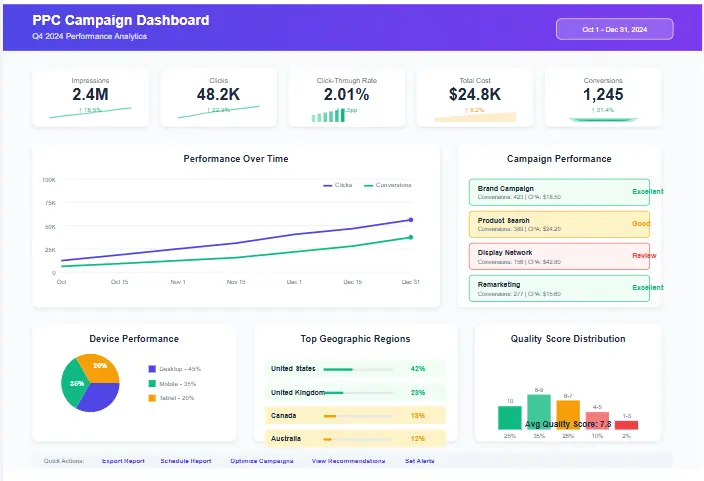
A typical PPC campaign dashboard showing performance metrics and analytics
Pro Tip: When analyzing your competitors’ PPC strategies, don’t just look at their current ads. Use tools like SEMrush or Ahrefs to view their ad history, revealing seasonal patterns and testing approaches they’ve used over time.
However, PPC in the PPC vs SEO comparison has its limitations. It requires continuous investment—stop paying, and your visibility disappears immediately. Additionally, as competition increases, so do the costs per click, potentially making it an expensive long-term strategy, especially for small businesses with limited budgets.
Key Components of PPC:
- Keyword Research: Identifying terms your target audience searches for
- Ad Creation: Crafting compelling copy that entices clicks
- Bidding Strategy: Determining how much to pay for each click
- Landing Pages: Designing optimized pages that convert visitors
- Quality Score: Maintaining Google’s rating of your ad relevance and landing page quality. Learn more about Google’s Quality Score here.
Understanding SEO: The Silent Warrior
Search Engine Optimization (SEO) is the less visible but equally powerful counterpart in the PPC vs SEO equation. SEO involves optimizing your website and content to rank higher in organic search results—those listings that appear below the ads on SERPs. Unlike PPC, you don’t pay for clicks on organic results, but earning those positions requires time, effort, and expertise. For official guidelines, refer to Google Search Central.
In the PPC vs SEO discussion, SEO is often described as a marathon rather than a sprint. Results aren’t immediate; it can take months to see significant movement in rankings. However, once achieved, organic positions tend to be more stable and can generate consistent traffic without ongoing per-click costs.
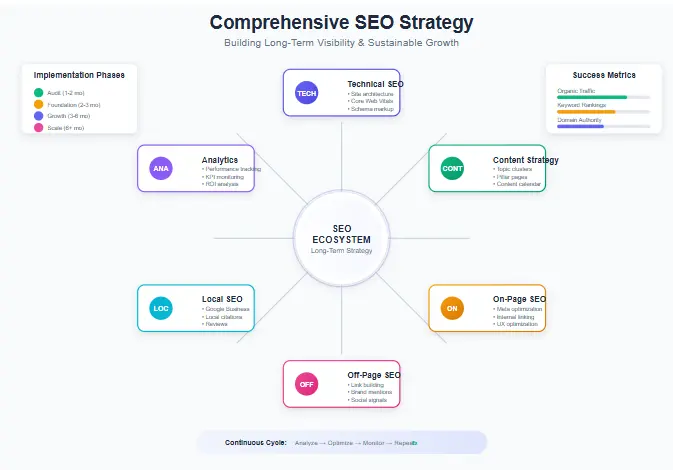
Implementing a comprehensive SEO strategy for long-term visibility
SEO encompasses various elements, from technical website optimization to content creation and link building. It requires a deep understanding of search engine algorithms, user behavior, and industry trends. When considering PPC vs SEO, many marketers find SEO more complex due to its multifaceted nature and the fact that search engines don’t fully disclose their ranking factors.
Core Elements of SEO:
- On-Page SEO: Optimizing individual web pages for search engines
- Technical SEO: Ensuring your site meets technical requirements of modern search engines. A comprehensive technical SEO audit can identify issues that might be hindering your site’s performance.
- Content Creation: Producing valuable, relevant content that answers user queries
- Link Building: Acquiring high-quality backlinks from authoritative websites
- User Experience: Creating a site that’s easy to navigate and provides value to visitors
Are Your Competitors Running Ads You Can’t See?
Now we come to the critical question: Are your competitors running ads that remain invisible to you? In the PPC vs SEO landscape, the answer is often yes. Several factors contribute to these hidden campaigns:
Geographic Targeting
Your competitors may be running PPC campaigns targeted to specific geographic areas that don’t include your location. If you’re searching from New York but your competitor is only targeting ads to California users, you won’t see their campaigns. This geographic targeting is a common strategy in the PPC vs SEO playbook, allowing businesses to focus their ad spend on markets where they can actually convert customers.
Ad Scheduling
Savvy marketers use ad scheduling to display their PPC ads only during specific hours or days when their target audience is most active. If you’re searching outside these timeframes, you’ll miss these campaigns entirely. This tactic is particularly relevant in the PPC vs SEO discussion because it demonstrates the precision control PPC offers compared to SEO’s 24/7 visibility.
Device Targeting
Your competitors might be targeting specific devices—desktop, mobile, or tablet—based on their conversion data. If you’re searching from a device they’re not targeting, their ads won’t appear in your results. This level of granularity is another point of differentiation in the PPC vs SEO comparison.
Demographic Targeting
Platforms like Google Ads allow advertisers to target specific age groups, genders, and even income levels. These demographic filters can create campaigns that are completely invisible to segments of the population, adding another layer to the PPC vs SEO complexity.
Search History and Personalization
Search engines personalize results based on your search history, browsing behavior, and various other factors. Two people searching for the same term may see different ads and organic results. This personalization means that in the PPC vs SEO battle, what you see isn’t necessarily what your customers see.
Important: Never rely solely on your own searches to analyze competitor strategies. Your search results are personalized based on your history, location, and other factors, giving you an incomplete picture of the PPC vs SEO landscape. If you’re struggling with visibility issues, our guide on why your website isn’t showing on Google can help diagnose the problem.
Reconnaissance Tools and Techniques
To truly understand the PPC vs SEO battlefield, you need specialized tools that can reveal these hidden campaigns. Here are some essential reconnaissance instruments for your mission:
PPC Intelligence Tools
Platforms like SEMrush, SpyFu, and iSpionage specialize in uncovering competitors’ PPC strategies. These tools can show you:
- Keywords your competitors are bidding on
- Ad copy variations they’ve tested
- Estimated ad spend and traffic
- Landing pages associated with their ads
- Historical ad performance data
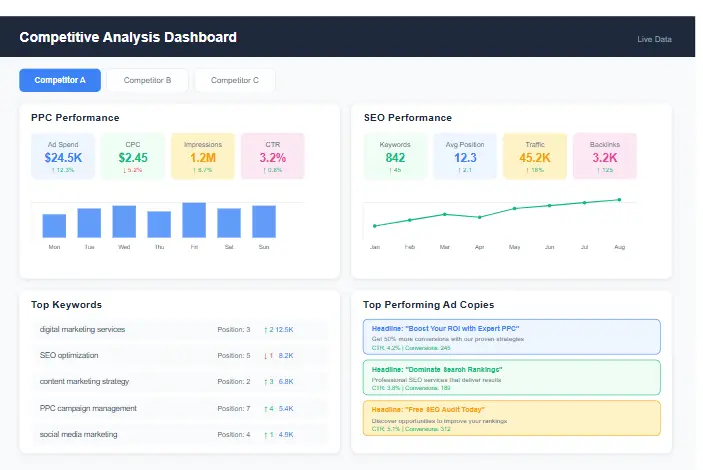
Competitive analysis dashboard revealing competitor PPC and SEO strategies
These insights are invaluable in the PPC vs SEO decision-making process, revealing opportunities you might have missed and threats you weren’t aware of.
SEO Analysis Tools
For the SEO side of the PPC vs SEO equation, tools like Ahrefs, Moz, and Majestic provide deep insights into competitors’ organic strategies:
- Keywords they rank for (including those you don’t)
- Backlink profiles and acquisition strategies
- Content gaps between your sites
- Technical SEO issues they’ve addressed
- On-page optimization techniques they employ
Rank Tracking Tools
Solutions like AccuRanker and Advanced Web Ranking allow you to monitor keyword rankings from different locations and devices, giving you a more accurate picture of the PPC vs SEO landscape than manual searches ever could.
Heatmap and User Behavior Tools
Platforms like Hotjar and Crazy Egg show how users interact with your site, revealing insights that can inform both your PPC and SEO strategies. Understanding user behavior is crucial in the PPC vs SEO debate, as both approaches ultimately aim to satisfy user intent.
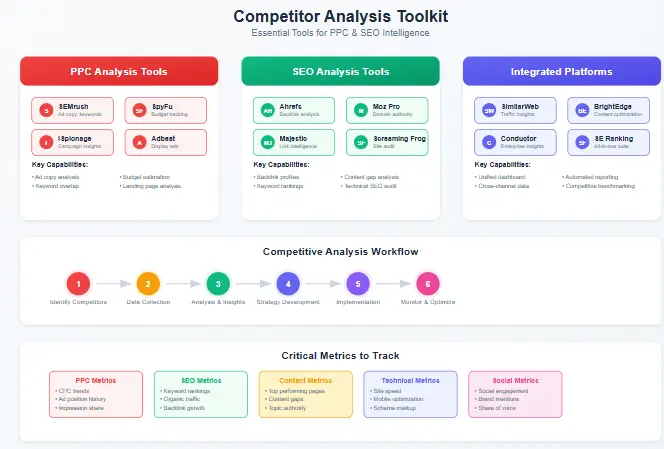
Essential tools for analyzing competitor PPC and SEO strategies
PPC vs SEO: A Comprehensive Comparison
To make informed decisions in the PPC vs SEO debate, let’s examine these approaches across multiple dimensions:
| Factor | PPC | SEO |
|---|---|---|
| Speed of Results | Immediate (hours to days) | Gradual (weeks to months) |
| Cost Structure | Pay per click (ongoing expense) | Investment in optimization (sunk cost) |
| Control | High (can adjust targeting, messaging, budget anytime) | Low (subject to algorithm changes) |
| Measurability | High (detailed conversion tracking) | Moderate (attribution challenges) |
| Sustainability | Requires continuous investment | Long-term asset once established |
| Trust Factor | Lower (users know these are ads) | Higher (perceived as earned placement) |
| Click-Through Rate | Lower (ad blindness) | Higher (perceived as more relevant) |
| Complexity | Moderate (platform-specific knowledge) | High (multidisciplinary approach) |
This comparison reveals that the PPC vs SEO decision isn’t about choosing one over the other but understanding how each serves different purposes in your marketing strategy.
When PPC Excels:
- For new websites needing immediate traffic
- For time-sensitive promotions or events
- When testing market demand for new products
- For targeting specific demographics or geographic areas
- When promoting products with short purchase cycles
- For remarketing to previous website visitors
When SEO Shines:
- For building long-term brand authority
- When targeting informational queries with high volume
- For businesses with limited ongoing advertising budgets
- When competing in markets with high PPC costs
- For creating a sustainable traffic source
- When targeting users in the research phase of the buying cycle
Integration Strategies: When PPC and SEO Join Forces
The most sophisticated marketers understand that the PPC vs SEO debate is a false dichotomy. The most powerful strategies integrate both approaches, leveraging their respective strengths. Here’s how to create a synergistic PPC and SEO strategy:
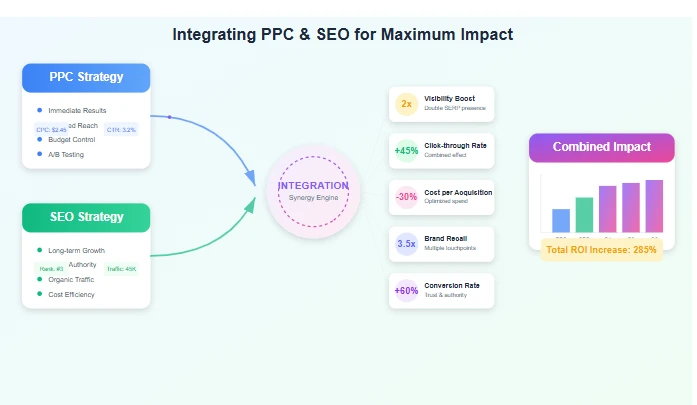
Integrating PPC and SEO strategies for maximum digital marketing impact
Shared Keyword Intelligence
Use PPC data to inform your SEO strategy. Keywords that convert well in PPC campaigns are prime targets for organic optimization. Conversely, SEO data on high-value keywords can guide your PPC bidding strategy. This shared intelligence breaks down the artificial barriers in the PPC vs SEO discussion.
Covering All SERP Real Estate
When you rank both organically and through PPC for the same query, you increase your visibility exponentially. Studies show that appearing in both paid and organic results significantly boosts click-through rates and brand perception. This dual presence is a powerful tactic in the PPC vs SEO arsenal.
Remarketing Synergy
Use SEO to attract initial visitors, then employ PPC remarketing to bring them back. This approach captures users at different stages of their journey, addressing the PPC vs SEO timing dilemma by using each channel where it performs best.
A/B Testing for SEO
PPC allows for rapid testing of headlines, descriptions, and calls-to-action. Apply these learnings to your organic listings and meta descriptions. This testing capability is a significant advantage in the PPC vs SEO comparison, as SEO traditionally offers slower feedback loops.
Seasonal Strategy Adjustment
Use PPC to capitalize on seasonal trends while building SEO authority for year-round performance. During peak seasons, increase PPC spend to capture immediate demand, while during off-peak periods, focus on SEO content creation to build long-term authority.
Integration Insight: Google’s Quality Score algorithm for PPC rewards relevance, which aligns with SEO best practices. Websites that excel at SEO often find their PPC costs decrease due to higher Quality Scores, blurring the lines between PPC vs SEO investment.
Case Studies: PPC vs SEO Success Stories
Let’s examine real-world examples that illustrate the power of both approaches in the PPC vs SEO landscape:
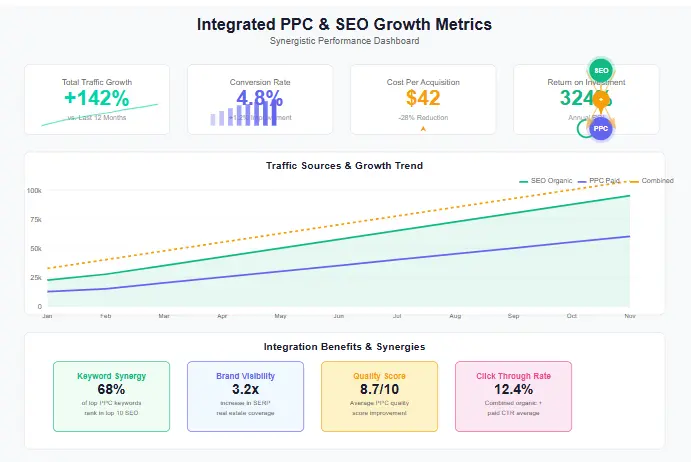
Business growth metrics showing the impact of integrated PPC and SEO strategies
Case Study 1: E-commerce Startup’s PPC-First Approach
An online retailer of sustainable home goods launched with a limited budget but needed immediate sales to validate their business model. They adopted a PPC-first strategy:
- Invested 70% of their marketing budget in highly targeted Google Shopping ads
- Used the remaining 30% for foundational SEO (technical optimization, essential content)
- Carefully tracked which products and keywords converted best
- Gradually shifted budget toward SEO for their proven best-sellers
Results: Within six months, they achieved profitability through PPC conversions. After 18 months, organic traffic accounted for 40% of their sales, reducing their customer acquisition costs by 35%. This case demonstrates how a strategic approach to the PPC vs SEO decision can evolve as a business grows.
Case Study 2: B2B Service Company’s SEO-First Strategy
A consulting firm specializing in supply chain optimization faced high PPC costs due to competitive keywords. They adopted an SEO-first approach:
- Created comprehensive guides addressing industry pain points
- Developed thought leadership content to attract backlinks
- Optimized their site for technical SEO factors
- Used limited PPC for remarketing and brand searches only
Results: After 12 months, they ranked in the top three for their primary keywords. Organic traffic generated 60% of their qualified leads, while their limited PPC spend captured high-intent prospects. Their cost per lead decreased by 45% compared to their previous PPC-heavy approach.
Case Study 3: Integrated PPC and SEO Success
A SaaS company offering project management software implemented an integrated strategy:
- Used PPC to capture immediate demand for their software category
- Simultaneously built SEO authority through comprehensive content
- Employed PPC data to identify high-converting keywords for SEO focus
- Used SEO content to support PPC ad groups with relevant landing pages
- Implemented remarketing campaigns for organic visitors who didn’t convert
Results: Within 9 months, they dominated page one for their target terms, appearing in both top ad positions and organic listings. Their integrated approach resulted in a 65% increase in conversion rates compared to their previous siloed strategy, proving that the PPC vs SEO debate should focus on integration rather than selection.
Future Trends in PPC and SEO
The PPC vs SEO landscape continues to evolve. Here are emerging trends that will shape the future of both disciplines:
Artificial Intelligence and Automation
AI is revolutionizing both PPC and SEO. Google’s Smart Bidding automates PPC campaign optimization, while AI-powered tools can generate SEO content and identify optimization opportunities. This trend is blurring the lines between PPC vs SEO, as both become more technology-driven.
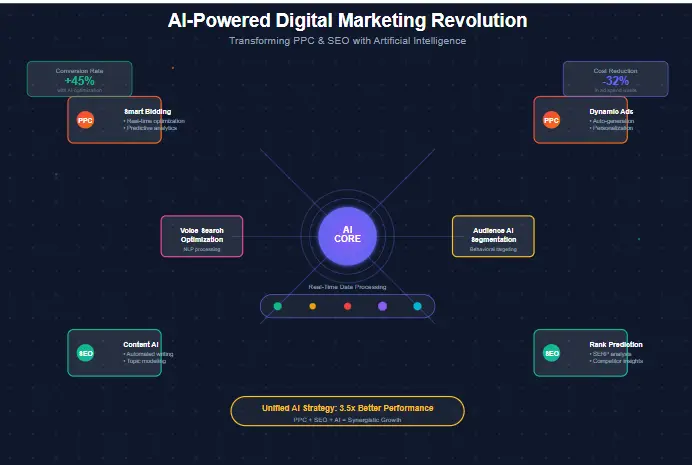
Artificial intelligence transforming the future of PPC and SEO strategies
Voice Search Optimization
With the rise of smart speakers and voice assistants, optimizing for conversational queries becomes crucial for SEO. PPC platforms are also adapting to this trend with new ad formats. Voice search represents a new frontier in the PPC vs SEO battleground.
Visual Search
Platforms like Pinterest Lens and Google Lens are making visual search increasingly important. This creates new opportunities for both PPC (visual ads) and SEO (image optimization), adding another dimension to the PPC vs SEO strategy.
Zero-Click Searches
Search engines are increasingly providing answers directly on SERPs, reducing clicks to websites. This trend challenges traditional PPC and SEO metrics, requiring new approaches to measure success in the evolving PPC vs SEO landscape. According to studies by SparkToro, over half of all Google searches end without a click.
Privacy Changes
With the phase-out of third-party cookies and increased privacy regulations, both PPC and SEO face new challenges. Attribution becomes more difficult, making the PPC vs SEO ROI calculation more complex.
Algorithm Updates
Search engines continue to refine their algorithms, with major updates happening regularly. Staying ahead of these changes is crucial for maintaining visibility. Our comprehensive guide to the Google algorithm update 2025 can help you prepare for upcoming changes that might affect your PPC and SEO strategies.
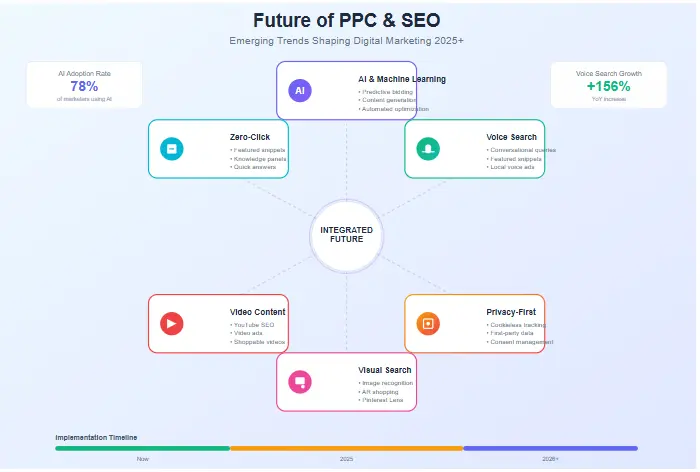
Emerging trends shaping the future of PPC and SEO
Conclusion: Your Mission, Should You Choose to Accept
As we conclude our reconnaissance mission into the PPC vs SEO battlefield, several key insights emerge:
First, the PPC vs SEO debate is not about choosing one over the other but understanding how each serves different purposes in your marketing ecosystem. The most successful businesses employ both strategically, allocating resources based on their specific goals, timeline, and competitive landscape.
Second, awareness of hidden competitor strategies is crucial. Your competitors are likely running campaigns you can’t see due to geographic, demographic, device, or scheduling targeting. Comprehensive competitive intelligence tools are essential for full visibility into the PPC vs SEO landscape.
Third, integration creates synergy. When PPC and SEO strategies work together—sharing data, insights, and opportunities—they create a whole greater than the sum of their parts. This integrated approach addresses the limitations of each channel while amplifying their strengths.
Finally, the PPC vs SEO landscape continues to evolve with technological advancements and changing user behaviors. Staying informed about emerging trends and adapting your strategies accordingly is essential for maintaining competitive advantage.
Your mission, should you choose to accept it, is to approach the PPC vs SEO decision not as a binary choice but as a strategic allocation of resources based on your unique business context. By understanding the hidden tactics of your competitors, leveraging the right tools for reconnaissance, and integrating both approaches into a cohesive strategy, you can dominate the digital battlefield and achieve sustainable growth.
Is Your Website Fully Optimized for Search?
Uncover technical issues, keyword opportunities, and competitive gaps with our comprehensive, no-obligation SEO audit.
Get Your Free SEO AuditRequest Your Free SEO Audit
Fill out the form below to get a comprehensive, no-obligation SEO audit for your website (koro).
